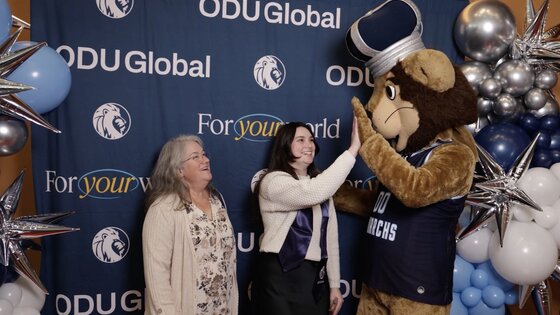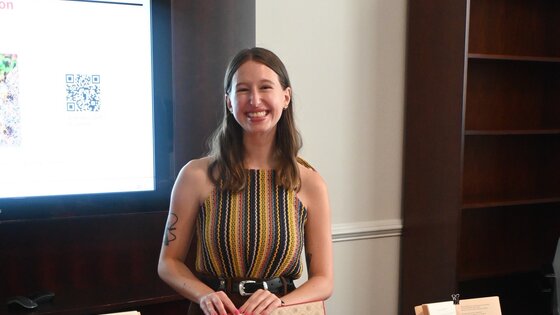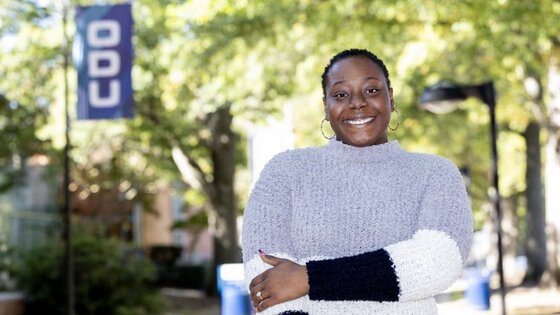ODU graduate Stephanie Barth '25 applies her public health degrees to combat rising tick-borne illnesses like Lyme disease and alpha-gal syndrome on Martha’s Vineyard and Cape Cod.

Spending summers on Martha’s Vineyard and Cape Cod might conjure up thoughts of "Jaws," particularly during the 50th anniversary of the Steven Spielberg classic blockbuster.
While tourists may worry about what lurks in the water, ODU graduate Stephanie Barth ’25 is more concerned with the bite of what’s hiding in the grass.
Barth, who received both her bachelor’s and master’s degrees in public health through ODUGlobal, spends her days tracking ticks and tick-borne illnesses as an epidemiologist in those areas along with Nantucket. And those days are busy.
Martha’s Vineyard has one of the highest rates of Lyme disease in the United States, according to the Vineyard Gazette, thanks to large populations of deer, mice and shrews.
“It’s a serious problem here, with about 40% of deer ticks carrying Lyme,” Barth said. “You track what works and what doesn’t, and then you try to raise awareness because it’s all about prevention and safeguarding yourself outdoors.”
And Lyme isn’t the only menace crawling through coastal Massachusetts. The lone star tick has also spread through the area, bringing with it a threat known as alpha-gal syndrome. A lone-star tick bite can lead to an allergy to red meat, causing severe gastrointestinal distress after consuming beef or pork. That tick is now a dominant species on Martha’s Vineyard, and alpha-gal syndrome cases have exploded from two positive cases in 2020 to 445 positive tests at Martha’s Vineyard Hospital in 2024.
The ticks can cause allergies as larvae, nymphs and as adults. Barth said the nymphs are almost invisible, and hundreds of ticks on a single blade of grass can transfer onto a hunter’s leg.
“We do work on the type of reactions people receive, but we also are trying to find out why two different types of ticks can coexist here, and why the population is so large here,” Barth said.
Barth’s work includes data analysis, surveying the population, finding patterns in patients who have experienced bites, and seeing if there’s a correlation between bites from different types of ticks and the patient’s reaction. She also plays a key role in communicating prevention strategies to the public.
She began her work on tick-borne diseases while still a student at ODU, researching trends related to alpha-gal syndrome as part of her degree practicum.
“I started working with real-world problems and data while I was a student,” Barth said. “The learning experience was very hands-on through the practicum.”
Barth’s expertise in tick-borne illnesses has roots in her academic journey through ODUGlobal.
After stopping her education after her first attempt at ODU in 2010, Barth re-enrolled at ODU planning for a career in biology. But her husband, who was serving in the Air Force at Langley Air Force Base in Hampton, Virginia, got transferred to Ramstein Air Base in Germany.
Barth no longer had access to campus and couldn’t pursue a lab-heavy program like biology. After meeting with an advisor, Barth discovered that public health might be her best option, as the program is entirely online.
“I was very hesitant. I had the biology baseline, but I didn’t know much about public health,” Barth said. “It seemed like my best option to keep moving forward with my education. I’m so glad I got that advice because I ended up falling in love with the variety of paths available to someone with a degree in public health.”
Barth’s undergraduate studies coincided with the COVID-19 pandemic, making the program feel timely and providing real-time examples of issues in public health.
She finished her undergraduate degree while in Germany—she also had two children while she was in college—and started work on her master’s program before her husband was transferred to Otis Air National Guard Base in Cape Cod.
“I had kids. We traveled and moved internationally,” Barth said. “There’s no way I could have balanced the schoolwork, the time zone differences and my life responsibilities without these online programs.”
Now Barth’s husband is also earning his degree through ODUGlobal. The flexibility of Barth’s programs inspired him to enroll in the online communications bachelor’s program, knowing he could fit college alongside his military work schedule.









